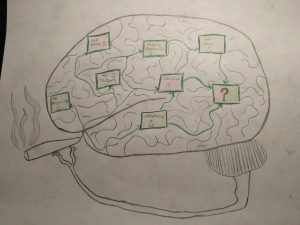
The use of cannabinoids such as marijuana have shown to have promising therapeutic effects on the brain such as reducing pain, promoting apoptosis in cancer cells, and preventing seizures. However, due to restrictions on obtaining the drug, it has become difficult to understand which aspects cause good results on which ones cause bad ones. There is still much unknown about cannabinoid medications.
Neurochemistry of endocannabinoids
Endocannabinoids (eCBs) are compounds naturally produced in the body and play a critical role in human physiology. AEA and 2-AG are the most common eCBs found in the body and produce effects of analgesia, appetite, anti-inflammation, and apoptosis. Each of these endocannabinoids bind to CB1 and CB2 receptors on the membranes of various types of neurons. Due to their integral role in basic human functions, there is strict control over the signaling of endocannabinoids. However many people have deficiencies in endocannabinoid signaling resulting in a need for external cannabinoid supplements to make up for the lack of natural endocannabinoids and relive symptoms.
Medicinal properties of cannabinoids:
There are many different cannabinoids that cannot be produced in the body but have a similar enough chemical structure to act in the same way as endocannabinoids. TCH is the most commonly used cannabinoid for recreational used and it found in Cannabis sativa. This drug can produce many medicinal effects for the body but also causes psychotropic effects. Because of these psychotropic side effects, THC is not able to be prescribed medicinally. Cannabidiol is another cannabinoid found from the same plant as THC, but it does not produce psychotropic effects. CBD controls many physiological functions seen with endocannabinoids and its medicinal uses include but are not limited to:
- Cancer treatment through activation of apoptosis pathways
- Antianxiety through serotonin release
- Pain reducer by inhibiting pain pathways in the brain
- Epilepsy medication by inhibiting neuronal activity
- Treatment of eating disorders by stimulating appetite
- Preserving neurons in people with Alzheimer’s disease

There is a seemingly endless list of medicinal uses for CBD although legal debate has left progression of its research at a standstill. There are still countless unknowns about how the drug works and how it effects the brain in the long term. Unfortunately, the lack of research on the drug has made it difficult to answer these questions.
Legal issues with cannabinoid medications:
Recent efforts to stimulate the progression of cannabinoid medicine have been made by several states. The legalization of medical marijuana has become an important first step for researching CBD and its medical properties. The major obstacle preventing further used of this drug is the fact that it is classified as a schedule 1 drug. This means that it is almost impossible for research institutions to get their hands on the drug to better understand how it works. With no research being done on it, medicinal marijuana cannot be prescribed like other drugs in a pharmacy. It is important to understand that while the safety of medicinal marijuana users should be a top priority, prevention of research on it may cause more harm than good. Of course we should not allow the general public to indulge in a drug that is not completely understood, but we should be able to find out more about it to find a way to prescribe it in a safe and effective manner. There is far too much potential in the medicinal properties of CBD and other cannabis derivatives that it would be a waste not to completely understand its function in the body. In the future, I hope we find a way to research drugs while preserving the safety of the general public.
Sources:
https://www.healthline.com/nutrition/cbd-oil-benefits
http://2018neurochem.pbworks.com/w/page/128067405/%22Endogenous%20cannabinoids%20revisited%3A%20A%20biochemistry%20perspective%22